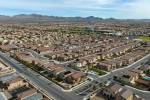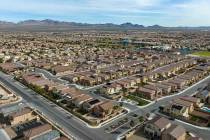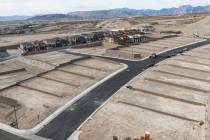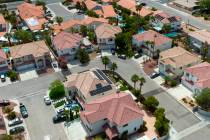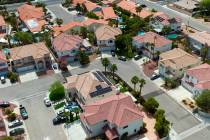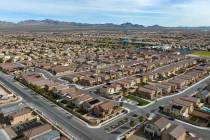‘Hardest-hit’ fund has yet to pay out
Struggling homeowners in Las Vegas have received nothing from the $194 million “hardest-hit” funds allocated by the government for states with the highest foreclosure rates, a November report from UNLV’s Lied Institute of Real Estate Studies said.
Nevada Affordable Housing Assistance Corp., the nonprofit organization selected to distribute the funds, does not have an office open for business, is not fully staffed and is not able to take homeowner applications, Lied Institute director Nasser Daneshvary said.
“I don’t think there are any shenanigans. They just don’t have their act together,” the University of Nevada, Las Vegas economics professor said Thursday.
The hardest-hit funds supplemented President Barack Obama’s $75 billion Home Affordable Mortgage Program, which has come under widespread criticism for its ineffectiveness in preventing foreclosures.
The funds were intended to help a total of 5,085 families in Nevada, even though thousands of households fall into the “struggling homeowner” category each month, Daneshvary said.
Nevada was among the first states chosen to receive federal funds to address special innovative programs aimed at the hardest-hit housing markets. Obama announced nearly $103 million in funding during a highly publicized trip to Las Vegas in February.
The U.S. Treasury added $34 million to the fund in August and $57 million in September.
Also, the Review-Journal reported in September that Nevada would receive an additional $43 million from the U.S. Housing and Urban Development’s Neighborhood Stabilization Program to help neighborhoods with the highest foreclosure rates.
NAHAC was selected by the Nevada Housing Division to create a business plan for the Emergency Economic Stabilization Act Program and to submit a proposal to the U.S. Treasury. In June, the division submitted a plan that included principal reduction, second mortgage reduction, accelerated short sales and mortgage assistance.
A posting on NAHAC.org states that the organization is not taking applications or maintaining waiting lists for the above programs now.
“If you are currently struggling to make your mortgage payment, are in any stage of mortgage delinquency or are already facing foreclosure, it is important for you to contact your loan servicer or a HUD-certified housing counselor immediately,” the website advised.
Homeowners who have not lived in the house for at least five years, or since 2005, do not qualify for the program.
“This restriction alone eliminates the preponderance of hardest-hit homeowners in the Las Vegas area who are upside down on their mortgage,” Daneshvary said. “A small group of homeowners, mostly those who purchased a home by the end of 2004, benefit from the program.”
As currently outlined, homeowners who have a loan-to-value ratio of 115 percent or less would qualify for the hardest-hit program. They would have to pay anywhere from $22,000 to $36,000 out of pocket to receive the potential $50,000 maximum benefit from the fund.
To help the estimated 80 percent of Las Vegas homeowners who owe more than their home is worth, the loan-to-value ratio would need to be increased to 150 percent and include Federal Housing Administration, Veterans Affairs, Fannie Mae and Freddie Mac loans, Daneshvary concluded.
Applying the maximum principal relief amount of $50,000 per household, the hardest-hit funds would help roughly one out of five households that received a foreclosure filing or had their homes repossessed in July alone, he said.
An August report from appraisal service CoreLogic showed an average home value of $176,000 in Nevada, compared with an average mortgage of $212,000, or negative equity of $36,000.
The report also showed Nevada with total residential property value of $104 billion and outstanding mortgage debt of $125 billion. That puts Nevada $21 billion underwater with a statewide loan-to-value ratio of 120 percent.
Contact reporter Hubble Smith at hsmith@reviewjournal.com or 702-383-0491.





